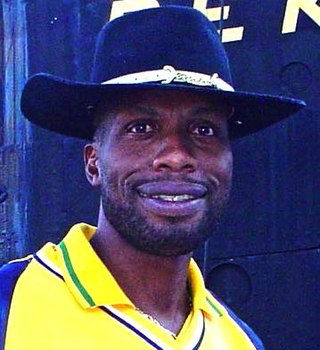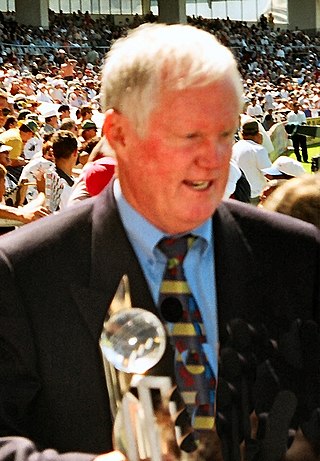Related Research Articles

Sir Curtly Elconn Lynwall Ambrose KCN is an Antiguan former cricketer who played 98 Test matches for the West Indies. Widely acknowledged as one of the greatest fast bowlers of all time, he took 405 Test wickets at an average of 20.99 and topped the ICC Player Rankings for much of his career to be rated the best bowler in the world. His great height—he is 6 feet 7 inches (2.01 m) tall—allowed him to make the ball bounce unusually high after he delivered it; allied to his pace and accuracy, it made him a very difficult bowler for batsmen to face. A man of few words during his career, he was notoriously reluctant to speak to journalists. He was chosen as one of the Wisden Cricketers of the Year in 1992; after he retired he was entered into the International Cricket Council Hall of Fame and selected as one of West Indies all-time XI by a panel of experts.

Jacques Henry Kallis OIS is a South African cricket coach and former professional cricketer. Widely regarded as one of the greatest cricketers of all time and as one of the greatest all-rounders ever to play the game, he was a right-handed batsman and right-arm fast-medium swing bowler. As of 2024, Kallis is the only cricketer in the history of the game to score more than 10,000 runs and take over 250 wickets in both ODI and Test match cricket. He has also taken 131 ODI catches. He scored 13,289 runs in his Test match career, took 292 wickets, and 200 catches. Kallis scored 45 Test match centuries and is the third highest test match run scorer in history. Kallis won 23 Man-of-the-Match awards, the most by any player in Test history.

Mark Verdon Boucher is a South African cricket coach and former cricketer who played all three formats of the game. Boucher is regarded as one of the best wicket-keeper batsmen of all time, and holds the record for the most Test dismissals by a wicket-keeper, with 532 catches and 555 total dismissals. Boucher was a member of the South Africa team that won the 1998 ICC KnockOut Trophy, the only time the country has won an ICC trophy till date.

Hedley Verity was a professional cricketer who played for Yorkshire and England between 1930 and 1939. A slow left-arm orthodox bowler, he took 1,956 wickets in first-class cricket at an average of 14.90 and 144 wickets in 40 Tests at an average of 24.37.

Robert Graeme Pollock is a former cricketer for South Africa, Transvaal and Eastern Province. A member of a famous cricketing family, Pollock is widely regarded as one of South Africa's greatest ever cricketers, and as one of the greatest batsmen in the history of cricket. Despite Pollock's international career being cut short at the age of 26 by the sporting boycott of South Africa, and all but one of his 23 Test matches being against England and Australia, the leading cricket nations of the day, he broke a number of records. His completed career Test match batting average of 60.97 remains the third best behind Sir Don Bradman and Adam Voges.
The 1912 Triangular Tournament was a Test cricket competition played between Australia, England and South Africa, the only Test-playing nations at the time.

Dale Willem Steyn is a South African former professional cricketer who played for the South African cricket team. He is regarded by many as the greatest bowler of the Modern Era. Steyn's ability to produce late swing at high pace - a rare and lethal combination amongst fast bowlers - made him stand apart from many of his contemporaries. Many cricketing legends have regarded his length deliveries unplayable when the ball swung. During the 2007–08 season, Steyn achieved a tally of 78 wickets at an average of 16.24, and was subsequently rewarded with the ICC 2008 Test Cricketer of the Year Award. He was named one of the Wisden Cricketers of the Year in 2013, and the Wisden Leading Cricketer in the World for the year 2013 in 2014's Wisden Cricketers' Almanack. In December 2015 he injured his shoulder in the Durban Test against England ; after this injury his career was a short lived one as it was followed by multiple injuries; these injuries were the reason why many cricketing greats didn't even consider post 2015 Steyn as "The Dale Steyn" which the batsmen feared to face. He was featured in Wisden Cricketers of the Decade at the end of 2019. He also was included in the ICC Test Team of the Decade at the end of 2020.
The South African cricket team toured Australia for cricket matches during the 2005–06 season. South Africa had already played two One Day International series during this season, beating New Zealand 4–0 at home before travelling to India and drawing the series there 2–2. The team had been playing 14 successive ODIs before arriving in Australia, with their last Test match against West Indies in April and May 2005. South Africa played one first class warm-up match, one three-day warm-up match without first class status, and one one-day match before they embarked on the three-Test series, which began on 16 December and ended on 6 January. They also participated in the 2005–06 VB Series, a three-team one-day tournament, along with Australia and Sri Lanka, where they finished last.

Douglas Thomas Ring was an Australian cricketer who played for Victoria and for Australia in 13 Test matches between 1948 and 1953. In 129 first-class cricket matches, he took 426 wickets bowling leg spin, and he had a top score of 145 runs, which was the only century of his career.

Albert Edward Ernest Vogler was a South African cricketer. A leading all-rounder skilled both at batting and bowling, Vogler played cricket in South Africa prior to becoming eligible to play for Middlesex County Cricket Club in England after serving on the ground staff of the Marylebone Cricket Club at Lord's. He rose to prominence during the 1906 home Test series and then in England the following year: he was described during the latter as the best bowler in the world by Tip Foster, and named a Wisden Cricketer of the Year.
The Australia national cricket team toured South Africa from February to April 1994 and played a three-match Test series against the South Africa national cricket team. The tour was Australia's first to South Africa since the end of the apartheid regime which had led to a sporting boycott of the country. Australia's most recent tour to South Africa had taken place in 1969–70 and a planned tour of the country in 1971–72 had been cancelled after the International Cricket Conference had imposed a moratorium on tours in 1970 and following the player withdrawals and protests which accompanied the tour of Australia by the South African rugby union side during 1971. The Australian Cricket Board postponed their proposed tour of Sri Lanka in order to schedule the series, paying A$50,000 compensation to the Board of Control for Cricket in Sri Lanka.
The Indian cricket team toured South Africa during the 1996–97 season, playing three Tests from 21 December 1996 to 30 January 1997. Prior to the series, India toured South Africa in the 1992–93 season, losing the Test series 0–1. India was led by Sachin Tendulkar while South Africa was led by Hansie Cronje. The series was Tendulkar's first overseas Test tour as captain and third overall. The tour began with a Test series, consisting of three matches. South Africa won the first two matches by a huge margin, thereby winning the series 2–0, while the final Test ended in a draw. At the end of the series, Brian McMillan of South Africa emerged as the top run-scorer with 296 runs, with an average of 98.66. He was closely followed by fellow team member Daryl Cullinan with 291 runs and India's Rahul Dravid. Allan Donald and Javagal Srinath finished the series as top wicket-takers capturing 20 and 18 wickets respectively. The former was named "man of the series".
The Zimbabwe national cricket team toured South Africa in October and November 1999 and played one Test match against the South Africa national cricket team. They also competed in the 2000 Standard Bank Triangular Tournament in January and February, playing six One Day International (ODI) matches against South Africa and England. This was the first time that Zimbabwe had toured to South Africa, although sides from both Zimbabwe and Rhodesia had played in South Africa as part of South African domestic cricket.

The South African national cricket team toured England during the 1907 cricket season, playing three Tests and twenty four first-class matches. South Africa's quartet of bowlers, Reggie Schwarz, Aubrey Faulkner, Bert Vogler and Gordon White were praised for the quality of their googly bowling, and two of the four—Schwarz and Vogler—were recognised as Wisden Cricketers of the Year the following year.
The New Zealand national cricket team toured South Africa from October 1953 to February 1954 and played a five match Test series against the South Africa national cricket team. South Africa won the Test series 4–0. The tour was the first by a representative New Zealand side to South Africa and the tourists embarked on their visit without having won a Test match since they had been granted full member status of the Imperial Cricket Conference in 1930.
The England cricket team toured South Africa in the 1956–57 season. The tour was organised by the Marylebone Cricket Club and the side played five Test matches as "England" and 15 other first-class matches as "MCC". Two of the first-class matches took place in Rhodesia in what is now Zimbabwe.
The New Zealand national cricket team toured South Africa from October 1961 to February 1962 and played a five-match Test series against the South Africa national cricket team. The series was drawn 2–2, with New Zealand's victory in the third Test the team's first Test match win outside their home country. New Zealand captain John Reid scored a total of 1,915 runs during the tour, setting a record for the most runs scored in South Africa by a touring batsman. The tour was the second to South Africa by a team from New Zealand, the previous tour having taken place in 1953–54.
The Indian cricket team toured Zimbabwe between 15 and 25 October 1992. The series was played as a prelude for India's tour of South Africa, and included just one Test match and one One Day International (ODI).
References
- ↑ The Zimbabweans in South Africa, 1999-2000, Wisden Cricketers' Almanack , 2001. Retrieved 2019-12-15.
- ↑ Ward J A brief history of Zimbabwe cricket, CricInfo. Retrieved 2018-04-17.
- 1 2 3 4 5 6 7 8 9 Dean G (2001) Zimbabwe v South Africa 1999-2000, Wisden Cricketers' Almanack , 2001. Retrieved 2019-12-16.
- ↑ South Africa to Zimbabwe 1999-00, Test Cricket Tours. Retrieved 2019-12-16.
- ↑ Tour of South Africa 1999-00, Test Cricket Tours. Retrieved 2018-04-14.
- ↑ Ward J (1999) Zimbabwe Test Grounds Undergoing Major Development, CricInfo, 1999-11-25. Retrieved 2019-12-16.
- 1 2 3 4 5 Ward J (1999) Zimbabwe v South Africa at Harare - Zimbabwe Cricket Online review, CricInfo, 1999-11-17. Retrieved 2019-12-16.
- ↑ Most runs in an innings by a nightwatchman, Records, CricInfo. Retrieved 2019-12-16.